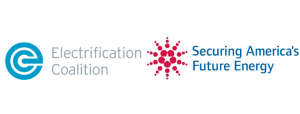
FOR IMMEDIATE RELEASE
February 7, 2019
Contact: Alex Adams | 202.461.2374 | aadams@secureenergy.org
Electric Vehicle Tax Credit Critical for American Economic and National Security Interests
In response to the introduction of the Fairness for Every Driver Act, which aims to eliminate the federal electric vehicle (EV) tax credit, Securing America’s Future Energy (SAFE) and Electrification Coalition (EC) President and CEO, Robbie Diamond, made the following statement:
“Diversifying our transport fuels away from oil is a matter of economic and national security, and should be considered an energy security priority. Our transportation system is 92 percent powered by oil—a volatile commodity, prone to spikes in price and primarily sourced from politically unstable parts of the world that share neither our strategic priorities nor our values. In contrast, electric vehicles run on a fuel that is diverse and domestic in source, as well as low and stable in price. Diversifying from oil as our overwhelming transport fuel source is a no-brainer for our economic and national security.”
Total national EV sales reached 1 million by November 2018, but they still represent just one out of every 50 cars sold in the United States, as less fuel-efficient SUVs and light trucks continue to lead the way. In addition, although U.S. oil production has hit record highs, the uniquely global nature of oil pricing means that a supply disruption anywhere in the world affects prices in the United States, regardless of how much oil we produce.
“Electric cars are growing in popularity, but they have not reached a tipping point. The federal EV tax credit is a crucial policy that has the potential to provide significant national security benefits—and as policing the world’s oil supply lines costs the U.S. military at least $81 billion every year, it provides excellent value for money,” Diamond added.
Currently the world’s largest oil consumer, the U.S. accounts for one-fifth of daily global supply, leaving the American economy uniquely vulnerable to oil price spikes and volatility. To mitigate this exposure, SAFE advocates for reduced dependence through increased domestic production, improved fuel efficiency and greater fuel choice.
The cost to fuel an EV is approximately half that of its conventional gasoline counterpart—generating meaningful savings for American households and businesses. EVs also benefit the broader U.S. economy and federal budget: The U.S. has spent $2.5 trillion on imported oil in the last 10 years, $1.6 trillion of which has flowed directly to OPEC member states.
About Securing America’s Future Energy (SAFE)
Securing America’s Future Energy (SAFE) is an action-oriented, nonpartisan organization that aims to reduce America’s dependence on oil. Near-total dependence on petroleum in the transportation sector undermines the nation’s economic and national security, and constrains U.S. foreign policy. To combat these threats, SAFE advocates for expanded domestic production of U.S. oil and gas resources, continued improvements in vehicle fuel efficiency, and transportation sector innovations including electric vehicles, natural gas trucks, and autonomous vehicles. In 2006, SAFE joined with General P.X. Kelley (Ret.), 28th Commandant of the U.S. Marine Corps, and Frederick W. Smith, Chairman, President, and CEO of FedEx Corporation, to form the Energy Security Leadership Council (ESLC), a group of business and former military leaders committed to reducing the United States’ dependence on oil. Today, the ESLC is co-chaired by Frederick W. Smith and General James T. Conway (Ret), 34th Commandant of the U.S. Marine Corps.
About the Electrification Coalition
The Electrification Coalition is a nonpartisan, non-profit group of business leaders committed to promoting policies and actions that reduce America’s dependence on oil by facilitating the deployment of electric vehicles on a mass scale. The members of the Electrification Coalition are leaders of companies representing the entire value chain of an electrified transportation system.
###
